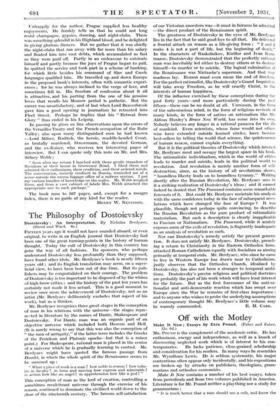The Philosophy of Dostoievsky
Dostoievsky : An Interpretation. By Nicholas Berdyaev. (Shoed and Ward. 6s.) FIFTEEN years ago it would not have sounded absurd, or even original, to write in an English journal that Dostoievsky had been one of the great turning-points in the history of human thought. Today the cult of Dostoievsky in this country has
gone the way of all fashions. Its sponsors, who perhaps understood Dostoievsky less profoundly than they supposed, have found other idols. Mr. Berdyaev's book is nearly fifteen years old ; and its English translation may seem, on a super- ficial view, to have been born out of due time. But its pub- lishers may be congratulated on their courage. The problem of Dostoievsky is too important to be disposed of by the whims of high-brow critics ; and the history of the past ten years has certainly not made it less actual. This is a good moment to review once more the achievement of Dostoievsky, not as an artist (Mr. Berdyaev deliberately excludes that aspect of his work), but as a thinker.
Mr. Berdyaev recognizes three great stages in the conception of man in his relations with the universe—the stages repre- sented in literature by the names of Dante, Shakespeare and Dostoievsky. For Dante, man was an organic part of an objective universe which included both Heaven and Hell. (It is surely wrong to say that this was also the conception of " the men of antiquity," if the latter term includes the Greeks of the Periclean and Platonic epochs—but that is a minor point.) For Shakespeare, rational man is placed in the centre of a universe which he is gradually learning to control. Mr. Berdyaev might have quoted the famous passage from Hamlet, in which the whole spirit of the Renaissance seems to be summed up : " What a piece of work is a man ! how noble in reason ! how infin- ite in faculty I in form and moving how express and admirable I in action how like an angel I in apprehension how like a god ! "
This conception of man as the lord of creation, controlling a sometimes recalcitrant universe through the exercise of his reason, continued to dominate the civilized world down to the close of the nineteenth century. The famous self-satisfaction of our Victorian ancestors was—it must in fairness be admitted —the direct product of the Renaissance spirit.
The greatness of Dostoievsky in the eyes of Mr. Berdyaev lies in the fact that he said good-bye to all that. He delivered a frontal attack on reason as a life-giving force : " 2 and 2 make 4 is not a part of life, but the beginning of death." In the characters of Raskolnikov, Kirillor and Ivan Kara- mazov, Dostoievsky demonstrated that the perfectly rational man was inevitably led either to destroy others or to destroy himself—to murder or to suicide. The logical culmination of the Renaissance was Nietzsche's superman. And that way madness lay. Reason must even mean the end of freedom. For the perfect rationalist, hie Dostoievsky's Grand Inquisitor, will take away Freedom, as he will crucify Christ, in the interests of human happiness.
Of the influence exercised by these conceptions during the past forty years—and more particularly during the past fifteen—there can be no doubt at all. Unreason, in the form of the subconscious mind, in the form of religious revivals of many kinds, in the form of satires on rationalism like Mr. Aldous Huxley's Brave New World, has come into its own. Nobody believes any longer in a rational panacea for the ills of mankind. Even scientists, whose fame would not other- wise have extended outside learned circles, have become best-sellers by telling the world that science, the quintessence of human reason, cannot explain everything.
But it is the political theories of Dostoievsky which interest Mr. Berdyaev most and occupy the largest space in his book. The rationalistic individualism, which in the world of ethics leads to murder and suicide, leads in the political world to revolution. And revolution is merely another form of self- destruction, since, as the history of all revolutions shows, " boundless liberty leads on to boundless tyranny." Writing shortly after the Russian Revolution, Mr. Berdyaev sees in it a striking realization of Dostoievsky's ideas ; and it cannot indeed be denied that The Possessed contains some remarkable forecasts of it. But could Mr. Berdyaev maintain his analysis with the same confidence today in the face of subsequent revo- lutions which have changed the face of Europe ? It was plausible, though not perhaps quite convincing, to describe the Russian Revolution as the pure product of rationalistic materialism. But such a description is clearly inapplicable to Fascism or Nationalism. The Possessed, while it acutely exposes some of the evils of revolution, is flagrantly inadequate as an analysis of revolution as such.
Nor can Dostoievsky's remedy satisfy the present genera- tion. It does not satisfy Mr. Berdyaev. Dostoievsky, preach- ing a return to Christianity in the Eastern Orthodox form, attacked Roman Catholicism equally with Socialism as aiming primarily at temporal ends. Mr. Berdyaev, who since he came to live in Western Europe has drawn near to Catholicism, justly observes that the Orthodox Church, idealized by Dostoievsky, has also not been a stranger to temporal ambi- tions. Dostoievsky's precise religious and political doctrines are probably the part of his work which will have least interest for the future. But as the first forerunner of the anti-ra- tionalist and anti-democratic reaction which has swept over Europe since the War he remains of first-class importance ; and to anyone who wishes to probe the underlying assumptions of contemporary thought Mr. Berdyaev's little volume may














































 Previous page
Previous page